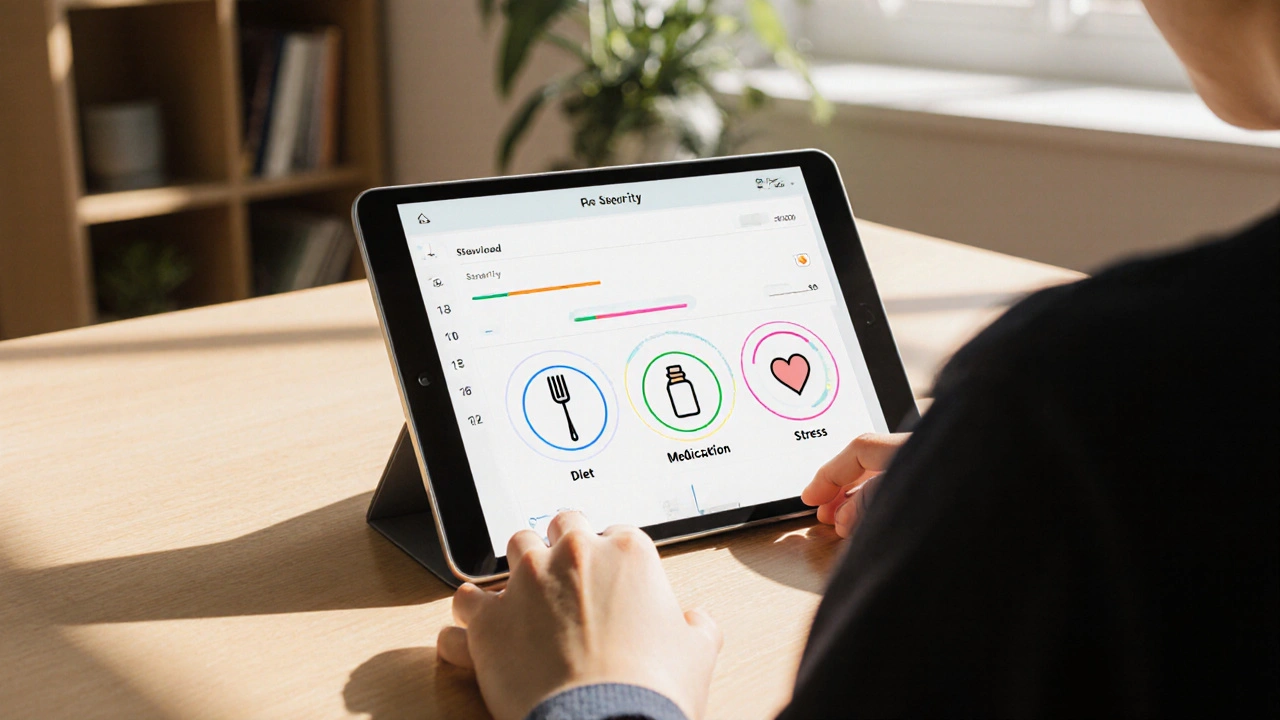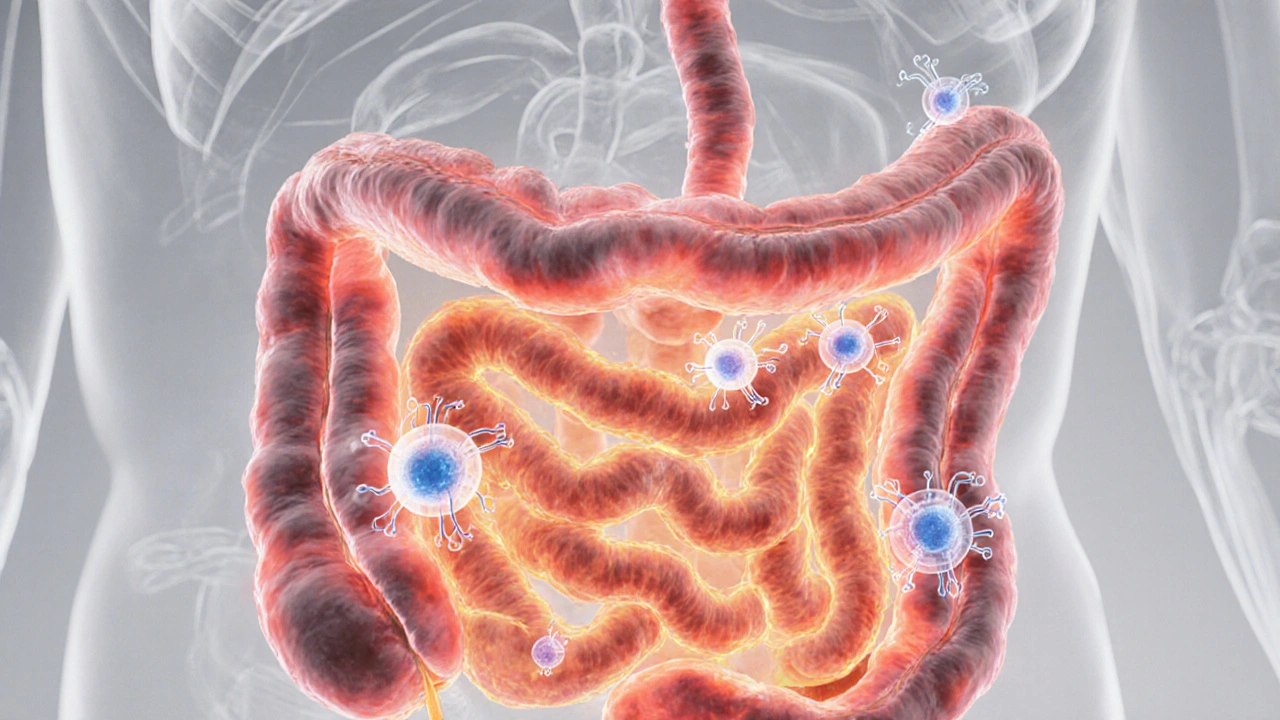Crohn's Disease Daily Management Tracker
Daily Management Areas
Diet & Nutrition
Monitor foods that trigger symptoms
Medication Routine
Track medication schedule and adherence
Stress Management
Identify stressors and coping methods
Daily Notes
Pro Tip
Tracking your daily experiences helps identify patterns and triggers. The more consistent you are with tracking, the better you'll understand what affects your condition.

Quick Takeaways
- Track symptoms and food reactions daily to spot patterns early.
- Choose a flexible, low‑residue diet that fits your lifestyle.
- Stick to a medication routine; use reminders or pill organizers.
- Plan for flare‑ups with a "symptom kit" and a clear action plan.
- Prioritize stress‑relief activities and connect with support groups.

What Is Crohn's Disease?
When you hear Crohn's disease is a chronic inflammatory bowel disease that can affect any part of the gastrointestinal tract, from mouth to anus, the first thought is often about pain and digestive trouble. In reality, it’s an immune system malfunction that mistakenly attacks the gut lining, causing inflammation, ulcers, and scar tissue. This inflammation is the engine behind most symptoms-abdominal cramps, diarrhea, fatigue, and weight loss. Understanding that the disease is driven by an overactive immune response helps you see why medication, diet, and stress management all target the same underlying inflammation.


Olivia Christensen
October 2, 2025 AT 12:00Hey there, I totally get how overwhelming daily tracking can feel 😊. Taking a few minutes each morning to jot down your symptoms and meals can make a huge difference. It’s also okay to have off‑days; the key is to stay consistent, not perfect. If you notice a particular food flare‑up, try swapping it out for something gentler and see how you feel. Remember, you’re not alone in this journey – many of us are cheering you on! 🌟
Lauren W
October 3, 2025 AT 20:38One must, of course, recognize that the purported "practical tips" are, in reality, a mere rehash of conventional wisdom; indeed, the author appears to have consulted no more than a cursory Wikipedia entry, or perhaps a decade‑old pamphlet, and thus presents a salutary yet ultimately pedestrian overview. Moreover, the emphasis on "tracking" is, frankly, a banal recommendation that any competent gastrointestinal specialist would have articulated centuries ago; it is hardly a revelation deserving of such fanfare. Nevertheless, if one insists upon adhering to these time‑worn prescriptions, one might at least employ a digital app rather than the archaic paper log, thereby demonstrating a modicum of modernity.
Crystal Doofenschmirtz
October 5, 2025 AT 05:17I appreciate the thoroughness of the guide, especially the emphasis on low‑residue diets and consistent medication schedules. It might also be helpful to note that individual triggers can vary widely, so a personalized food diary could uncover less obvious culprits. Additionally, incorporating a brief mindfulness routine-perhaps five minutes of guided breathing-has been shown to reduce stress‑related flare‑ups. Overall, it’s a solid foundation for anyone looking to gain more control over their daily management.
Pankaj Kumar
October 6, 2025 AT 13:55Namaste, friend! Your dedication to tracking each symptom, meal, and mood is truly inspiring – it paints a vivid tapestry of your body's whispers. Imagine each entry as a brushstroke on a canvas; over time, the picture becomes clearer, revealing patterns that guide wiser choices. Embrace colorful, wholesome foods that soothe the gut, and celebrate small victories with gentle gratitude. Keep forging ahead; your perseverance lights the path for many fellow travelers.
sneha kapuri
October 7, 2025 AT 22:33Honestly, this "tracker" is just a glorified checklist for people who can't handle real responsibility. If you think clicking a few buttons will magically tame Crohn's, you're deluding yourself. Most of these tips are generic fluff that anyone with half a brain can figure out without a fancy form. Stop wasting time on gimmicks and confront the harsh reality that your disease will dominate unless you accept it.
Harshitha Uppada
October 9, 2025 AT 07:12yeah this tipz r kinda basic lol u could prob just use a notebook n not overthink it. its like saying "drink water" when ur already thursty. maybe try sumthing realy new next time.
Randy Faulk
October 10, 2025 AT 15:50Dear reader, allow me to commend the systematic approach presented herein. Maintaining a meticulous log of symptom severity alongside dietary intake furnishes clinicians with indispensable data, thereby facilitating tailored therapeutic adjustments. It is also advisable to schedule periodic consultations with a gastroenterology specialist to review trends identified in your records. Adherence to such protocols has been empirically associated with diminished flare‑frequency and enhanced quality of life.
Brandi Hagen
October 12, 2025 AT 00:28Okay, let me break this down for everyone who apparently missed the obvious: you think tracking your food and meds is some revolutionary hack? Please. We've been doing this since the dawn of gastro‑medicine, and yet people keep posting the same naïve advice as if it's groundbreaking 🚀. First of all, the “low‑residue” diet isn’t a one‑size‑fits‑all; it’s a guideline that must be customized to your personal tolerances, not some cookie‑cutter plan that you found on a random blog. Second, stress management isn’t just “take a deep breath”; you need a comprehensive strategy that includes cognitive‑behavioral techniques, regular physical activity, and perhaps even community support groups – because isolation only fuels anxiety. And don’t even get me started on medication adherence – using a simple pill organizer and setting multiple phone alarms is the bare minimum, not the pinnacle of innovation 🙄. Finally, remember that convenience apps often lack the nuance required for serious chronic disease monitoring; sometimes a handwritten journal trumps any digital nonsense. So, there you have it – a reality check wrapped in a sarcastic package. 🎭
isabel zurutuza
October 13, 2025 AT 09:07yeah sure, because tracking your poop is totally groundbreaking.
James Madrid
October 14, 2025 AT 17:45Great rundown! I’d add that pairing the daily log with a quick 10‑minute stretch routine can help keep the gut moving and reduce discomfort. Also, consider setting a weekly reminder to review your notes and adjust any food choices accordingly. Keep up the consistency, and you’ll likely see fewer surprise flare‑ups.
Justin Valois
October 16, 2025 AT 02:23Listen, I gotta say the whole "track everything" thing feels like overkill, but if you really wanna do it, at leaste make sure ur app dont sync all your data to some government server – you never know who’s watching. Also, dont forget to add note about any weird rashes or mood swings; sometimes those are the real clues. Just try not to get too obsessive, bro – balance is key.
Jessica Simpson
October 17, 2025 AT 11:02From a cultural perspective, many Indigenous healing practices emphasize the connection between mind, body, and earth, often using herbal teas and mindfulness rituals that align with low‑residue principles. Incorporating such traditions, like sipping ginger‑turmeric infusion after meals, can complement modern medical regimens. Also, sharing experiences within community circles can provide emotional support that many patients overlook. It's worth exploring these holistic angles alongside the practical tips already outlined.
Ryan Smith
October 18, 2025 AT 19:40Sure, track your symptoms, but don't forget that big pharma probably wants you glued to their pills while they hide the real cure. Meanwhile, stress relief apps are just selling you more data. Stay skeptical, keep your eyes peeled, and maybe try an old‑school meditation technique that isn't patented.
John Carruth
October 20, 2025 AT 04:18First and foremost, congratulations on taking the proactive step of logging your daily experience – that alone sets a solid foundation for long‑term success. By consistently noting symptom severity, you create a data set that can reveal subtle trends invisible to the naked eye, such as a slight increase after certain fiber‑rich meals. Over time, these patterns empower you to make informed dietary adjustments, reducing the likelihood of unexpected flare‑ups. Additionally, integrating a brief mindfulness practice, even just five minutes of focused breathing, can mitigate stress‑induced inflammation, a hidden driver of many gastrointestinal issues. Pairing this with a reliable medication schedule, perhaps using a simple alarm or pill box, ensures you never miss a dose, maintaining therapeutic levels in your system. Remember, the gut‑brain axis is bidirectional; when you calm your mind, you often calm your gut. Celebrate each day you stick to the routine, no matter how small the win, because cumulative consistency is the engine of improvement. If a particular food consistently triggers discomfort, consider substituting it with a tolerated alternative that offers similar nutritional benefits. Keep a close eye on hydration – electrolytes play a crucial role in gut function, and dehydration can exacerbate symptoms. Engage with a support community, whether online or in‑person, to share insights and gain encouragement when motivation wanes. Celebrate milestones, such as a week without severe symptoms, as these reinforce positive behavior. Adjust your plan as needed; flexibility is key when living with a chronic condition. Finally, regularly review your log with your healthcare provider to fine‑tune treatment strategies, ensuring you receive the most personalized care possible. Stay patient, stay persistent, and trust the process – the data you collect today will guide a healthier tomorrow. Your commitment today paves the way for a brighter, symptom‑free future.